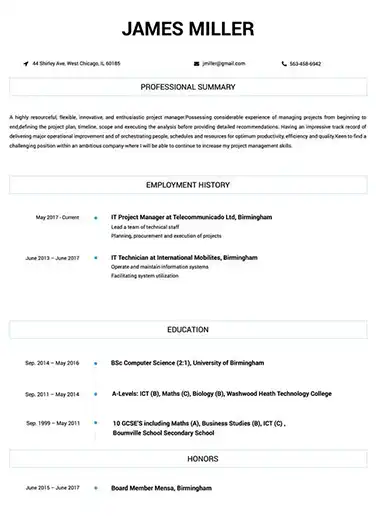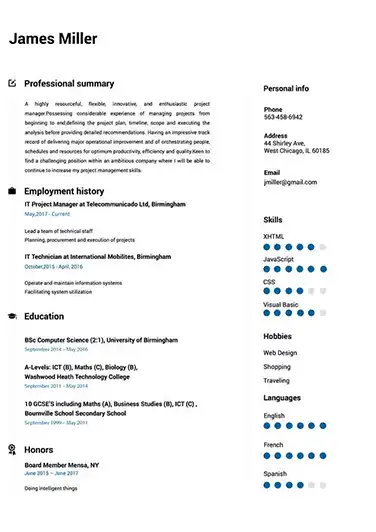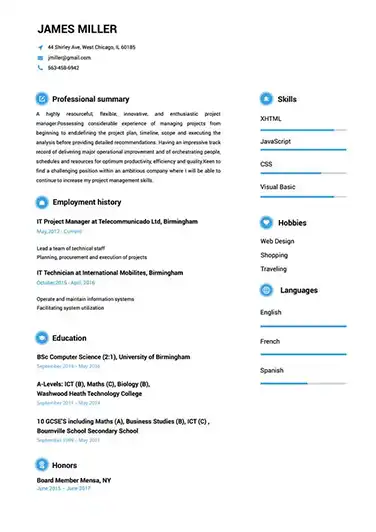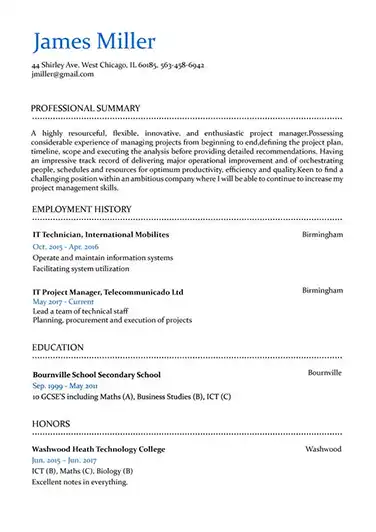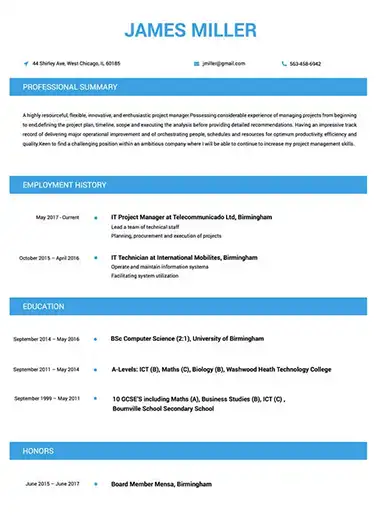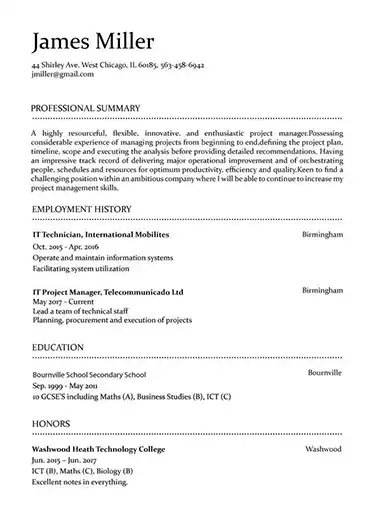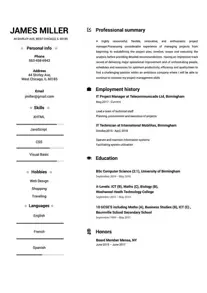 Use This Template
Use This Template
Build your resume in 15 minutes
Create an awesome resume that meets the expectations of potential employers with our selection of professional, field-tested resume templates.
business analyst: Resume Samples & Writing Guide
adamwilson41@yahoo.com
789-089-4126
Employment history
- Develop and analyze financial models to support business strategy and planning
- Prepare presentations to communicate findings to stakeholders
- Analyze data to identify trends and provide insights to support decision making
- Gather, analyze, and interpret data to develop recommendations for business decisions
- Lead projects and initiatives to support business objectives
- Develop and implement processes to track performance against key metrics
- Monitor and review business performance to identify areas of improvement
- Lead projects and initiatives to support business objectives
- Support the development of strategic plans and initiatives
Education
Skills
Do you already have a resume? Use our PDF converter and edit your resume.
umbertobaker41@gmail.com
769-028-7696
Employment history
- Monitor and review business performance to identify areas of improvement
- Gather, analyze, and interpret data to develop recommendations for business decisions
- Analyze data to identify trends and provide insights to support decision making
Education
Skills
halkelly@aol.com
838-707-4090
Employment history
- Analyze data to identify trends and provide insights to support decision making
- Identify areas of improvement and recommend solutions
- Develop business cases to support investments and initiatives
- Develop and implement processes to track performance against key metrics
- Collaborate with stakeholders to define business requirements
- Prepare presentations to communicate findings to stakeholders
- Support the development of strategic plans and initiatives
- Develop and analyze financial models to support business strategy and planning
- Prepare presentations to communicate findings to stakeholders
Education
Skills
georgewilson98@hotmail.com
706-618-3199
Professional Summary
Employment history
- Collaborate with stakeholders to define business requirements
- Analyze data to identify trends and provide insights to support decision making
- Develop and implement processes to track performance against key metrics
- Develop and maintain relationships with key stakeholders
- Collaborate with stakeholders to define business requirements
- Gather, analyze, and interpret data to develop recommendations for business decisions
- Develop business cases to support investments and initiatives
- Lead projects and initiatives to support business objectives
- Develop and maintain forecasting models to support business planning
Education
Skills
cecilgray91@gmail.com
886-616-5363
Employment history
- Develop and maintain relationships with key stakeholders
- Prepare presentations to communicate findings to stakeholders
- Research and analyze industry trends to identify opportunities and risks
- Develop and maintain relationships with key stakeholders
- Develop and maintain forecasting models to support business planning
- Research and analyze industry trends to identify opportunities and risks
- Identify areas of improvement and recommend solutions
- Develop and implement processes to track performance against key metrics
- Prepare presentations to communicate findings to stakeholders
Education
Skills
Not in love with this template? Browse our full library of resume templates
Business analysts are highly valued within any organization on account of how much value they can provide through their expertise. Typically, business analysts analyze a company or business group and document the various processes or systems being used by that business.
By recording and assessing the business model in question, business analysts can help to guide companies in new and exciting directions, in addition to improving the existing processes and systems as much as possible.
In the following guide, we’ll be walking you through how to write the perfect business analyst resume, designed to catch the recruiter’s eye and jump-start you to the top of the pile. If you’re planning on applying to a business analyst position and you’d like a bit of advice about how best to structure your resume, this is the article for you.
Multiple Template Examples
How to Write the Perfect Business Analyst Resume
How to Format It
There are several different formats you can opt for when writing a business analyst’s resume, including the reverse chronological layout, the functional format, and the combination format, which blends the best elements from the two other choices. The ideal format for you will depend, essentially, on how much experience you have.
If you don’t have any experience working as a business analyst, it’s best to go for the reverse chronological format. By focusing on your most recent professional position (as well as your degree) you’ll be able to distract from the fact that you haven’t worked as a business analyst before.
On the other hand, if you have plenty of experience working as a business analyst, the combination format is the best layout, because it offers an easy way to combine your skills and experience in one easy section.
What Recruiters Will Look For
When recruiters are going through a stack of resumes for business analyst candidates, they’re going to be keeping an eye out for a few things in particular. It’s no wonder, either, considering the sheer amount of responsibility every business analyst has in their organization of choice.
It’s not an easy job, and there are no two ways about it — sooner or later, you’re going to need to prove your worth by providing top-notch analysis and an objective or calculated summary of the current processes your employers are using. The goal of your resume should be to show whoever’s hiring you that you’re up to the task. Keeping that in mind, here are some of the things that will impress recruiters the most when they’re reading your business analyst resume:
1. A Broad Understanding of the Business World
Owing to the highly technical and analytical nature of your work as a business analyst, you’ll need to prove to the recruiter that you’re already fully grounded in the business world. It’s not good enough to know a thing or two about how businesses are run; you need to have a rock-solid grasp of all the ins and outs.
Business analysts who understand the corporate landscape and what’s required are a much more exciting proposition than ones who need a little help or training in understanding the finer points of the area. Prove that you know the business world inside and out, and you’ll catch the recruiter’s eye right away.
2. The Ability to Make Complicated Ideas Seem Simple
This one is every bit as important as understanding the business world itself, since a large part of your job will involve presenting the results of your work to people who won’t necessarily be experts in the field. There’s no point in conducting a top-notch analysis of your employer’s business if you’re not able to then condense the more technical points into a straightforward, layman-friendly format.
As well as its direct applications to the position, being able to make complicated things seem simple is an attractive trait across the board. It indicates intelligence, as well as a deep understanding of what you’re talking about in the first place, and it facilitates the kind of interdepartmental collaboration that is so crucial to the way modern businesses are run.
Which Hard & Soft Skills to Include and How to Do It Correctly
Knowing the difference between hard and soft skills is vital for any job you might want to apply for, but in the case of business analyst’s role - it’s a little less straightforward. You may not even know what the hard and soft skills are exactly, since it’s not as obvious as in some other jobs.
Luckily, however, there’s a way around the problem. Business analysts, just like other professions, have clearly defined hard and soft skills that you should be able to differentiate and list without much difficulty. Here’s a comprehensive list of what you should be keeping in mind as you set about creating this aspect of your resume:
Hard Skills
The hard skills that business analysts use in their day-to-day work mostly involve the actual analytic work they do. For this reason, you need to focus on as many specific, technical details as you can, across as many different platforms and disciplines as possible. Here are some of the hard analytic skills you should consider including:
- The ability to create a Process Flow Diagram (visual)
- Familiarity with Business Process Models (textual)
- Proficiency with MS Office programs like Word, Excel, and PowerPoint, as well as a visual modelling tool such as Microsoft Visio
- The ability to use requirements management tools, like DOORS or Caliber
Soft Skills (H4)
If you can tick the analytical boxes mentioned above, you’ll already be presenting yourself as a strong candidate for the business analyst position you’re applying for. To take your resume to the next level, though, make sure to nail the soft skills portion of your resume, since they’re every bit as important as the purely technical aspects of the job. Here are the main soft skills to include:
- The ability to manage projects by yourself, or at least with minimal guidance
- Excellent interpersonal skills, particularly with regards to building relationships
- Problem-solving acumen
- Comfort receiving constructive criticism and incorporating it into your work to improve the end product
- Communication skills
- The ability to delegate well
- Confidence with regards to coordinating work across a range of different departments
What Achievements to Mention and How to Do It Correctly
Achievements are always impressive, no matter what kind of job you’re applying for, but in the case of a resume for a business analyst position, your achievements section gives you a great chance to really show you know what they’re looking for.
Because the job itself is so diverse by nature, if you can show yourself to be a well-rounded individual you’ll impress the recruiter. Compare this, for example, with a much more specific position like an IT specialist. While achievements made in non-IT areas might seem like a distraction in that case, when it comes to being a business analyst they can make all the difference.
Don’t shy away from mentioning achievements that aren’t strictly related to business. Any leadership experience you have will make a good impression, be that in volunteering positions or even a project you undertook at university. Similarly, proof of critical thinking excellence is highly valued — the perfect example for this is a prize you won for an essay at some point.
What to Avoid Mentioning
Just as there are things which are good to mention, there are also points that you’d be better off avoiding entirely. For example, mentioning that you already have an all-inclusive understanding of the business world would be a big mistake, given that it’s impossible to know everything. A large part of the business analyst role is being able to adapt on the job to new information and to be committed to continually improving your own knowledge, and understanding.
Generally speaking, anything that makes the role seem straightforward or simple will be a big red flag to any recruiter going through your resume. Don’t shy away from the complexity of the job by claiming you already understand it inside and out. Rather, embrace the fact that it’s a complicated position, and focus instead on showing that you understand the role thoroughly.
How to Write Resume Objectives and Examples of These
Your resume objective is a great opportunity to make a couple things abundantly clear to the recruiter. Firstly, you’ll be able to show that you’ve gone through the listing in great depth: you can demonstrate this by using specific, targeted language that plays off of some key details mentioned in the description. A well-written objective will also help focus the recruiter’s attention on the most impressive and relevant skills you possess. Take a look at these two examples for inspiration when you go to write your own business analyst’s resume objective:
- Looking to contribute 6 years of experience working as a business analyst to that position at ABC Corp, utilizing a bachelor’s degree in addition to strong problem-solving skills and the ability to present results in a straightforward, jargon-free manner.
- Ambitious, focused individual seeking mid-level Business Analyst role at XYZ Inc, leveraging exceptional interpersonal communication skills, extensive experience with business process modelling, and strong problem-solving acumen to carry out client business analysis.
How to Write a Resume Summary and Examples of This
A resume summary focuses on how much you’ll be able to improve the company you’re applying to, if they were to hire you. Instead of the dry, impartial voice required in writing a resume objective, you should aim for a more active, persuasive style of writing for your summary. Pay particular attention to the below examples, as they’ll show you how you can train the spotlight on your past achievements and successes without seeming over the top.
- Experienced business analyst keen to bring problem-solving skills and in-depth knowledge of processes to the same role in XYZ LLC. I love diving into business models and using my analytical ability to come up with clear, emphatic improvements that could be made. I’m passionate about making business models as elegant and effective as possible, and I’m always ready to learn more about the business world.
- Professional business analyst interested in taking on a new challenge at ABC Corp. and furthering my ability to provide expert analysis and in-depth advice on existing business models. In most recent professional experience as a business analyst I was able to present my findings in clear, down-to-earth language which facilitated interdepartmental collaboration. I’d welcome the opportunity to bring my skills to bear in a new challenge at your organization.
How to List Any Additional Details, like Certifications, Volunteering Experience, Etc.
Because being a business analyst is a complex, wide-ranging role by nature, listing additional details such as certifications you’ve received and volunteering experience can help give you an edge over your competition. It’s important that you come across as a well-rounded, highly capable individual, and the additional details section is also a great chance to display some secondary characteristics such as leadership abilities and interpersonal skills. Here are the best ways to include extra information in your business analyst resume.
1. Certifications
Whether they were earned online or from a regular brick-and-mortar institution, additional certifications you’ve gained over the years are always a good thing to mention. Not only does it help to portray you as a self-starter, it also makes it clear that you have reserves of inner grit that help you see a task through to its completion, which is a particularly attractive trait for business analysts, given the challenging nature of their work.
When you talk about your certifications - less is more, so keep the information short and to the point. All you really need is a line or two that details what the certification actually is, where and how you earned it, and what drove you to pursue that qualification in the first place.
2. Personal Projects
Personal projects you’ve completed in your own free time tell the recruiter a few important things about you. For example, if you’re into woodworking, talking about a few of your most recent constructions will show that you’re a creative person who naturally seeks out new challenges in addition to their standard routine. Moreover, you’ll be helping to present yourself as somebody who isn’t tied down to any one area, which will be very attractive to recruiters hiring for a business analyst position.
Most personal projects will tie into your hobbies and interests, so when you’re considering what to write in this section, make sure you keep your focus on how these achievements are likely to be perceived by the person reading your resume.
How to Write a Business Analyst Resume When You Have Limited or No Experience
Sitting down to write a full resume for a position you have little to no prior experience with can often seem overwhelming, but it doesn’t need to be. Although you’ll be at a natural disadvantage compared to other candidates who might have extensive experience working as business analysts, there are a few steps you can take to help paint your application in the best possible light.
The most important thing to get right is your education section, since that’ll be one of the first places your future employers will be looking to get a more well-rounded idea of who you are as a person. A degree is important, of course, but don’t be afraid to talk about further achievements you managed to pull off throughout your years in education, as this will help offset your lack of experience by bringing other aspects of your personality into the equation.
Another great tip we can give you is to spend as much time as possible on your resume objective or resume summary, depending on which is required. Don’t spare any effort in researching what a great business analyst’s resume objective should look like, and be sure to make several drafts of your own as a means of ensuring it’s as strong as it possibly can be. Because a resume objective doesn’t focus as much on past experience as a resume summary, it’s an excellent way to talk about the value you can bring to your new job without being distracted by a lack of relevant work history.
How to Target Your Resume for a Specific Application
No matter how impressive your resume is in other respects, if you can’t target it to the specific position you’re applying for, you’ll be letting yourself down. Given the fact that you’ll be competing against several other candidates, you need to stand out in as many ways as possible. When a recruiter sees a resume that has clearly been written to take into account the job’s specific requirements, it makes an immediate impression.
The best way to target your resume to the specific job you’re trying to win is to read the job listing itself as closely as you can. Be on the lookout for a few specific terms, which might indicate more exactly what the recruiters are looking for. Once you’ve figured out what they want to hear, all you need to do is talk about how you can meet those needs by mentioning the relevant skills and experience you have.
.
See below for the most important business analyst skills that employers are likely to be looking for in the resumes they go through:
1. Technical Competence
A business analyst without much analytical ability isn’t going to be a lot of use to any organization. On the other hand, a business analyst that can talk about exactly which programs and processes they’re experienced with could jump to the front of the queue.
If there’s a lot of talk in job posting about the technical and analytical side of the position, make sure to focus as much as possible on the exact ways you can handle the demands of the job, such as analysis processes you’re familiar with and software packages you’ve used before.
2. Interpersonal Excellence
In addition to the technical work you’ll be doing as a business analyst, you’ll no doubt have to do a lot of interdepartmental work with your colleagues. This can be challenging for a lot of professionals, as it requires emotional intelligence and leadership skills on top of the analytical work that business analyst roles require.
Words like team, communication, and people skills are a good sign that the recruiters will be particularly interested in a candidate with strong interpersonal abilities. If you come across those terms, don’t be afraid to talk in depth about how you’ve been able to leverage your interpersonal skills in past roles to great effect.
How to Make Your Resume Stand Out
Making your resume stand out among a huge stack of others is easier said than done, but there are a few simple tips you can follow to make sure you’re giving yourself the best chance. The most important thing is to keep your focus on what exactly is required of a business analyst throughout the course of their day-to-day work.
Because your routine will vary based on the demands of the position, you’ll need to sell yourself as a versatile, dynamic character that can adapt to change and thrive even in difficult situations. Too often, people assume that business analyst positions are solely technical, leading them to neglect the interpersonal side of the job. If you can switch the focus towards your soft skills, you’ll be making an impression from the very off, as most of your competition will be focusing on the analytical abilities they can offer.
You’ll also need to prove that you can work with minimal guidance. Business analyst roles typically come with a large degree of responsibility, particularly for some of the bigger projects they’ll be asked to take on. An ideal candidate is one who works well in a team, but can also function autonomously, with little or no oversight from higher management.
If you can make it clear that you’re used to working well on your own, you stand a great chance of separating yourself from the herd. An employee who doesn’t need to be micromanaged is an incredibly attractive proposition to organizations across the board, particularly if the rest of the candidates neglect to focus on that aspect of what they can offer.
How Resumebuild can Help You to Write an Outstanding Business Analyst Resume
With so much to consider, creating a business analyst resume can seem like a challenging task. Fortunately, however, there’s a ready-made solution to the problem that can make your life a whole lot easier: Resumebuild’s resume building tool.
Offering hundreds of professionally pre-built templates packaged in a slick, easy-to-use interface, this resume building tool makes creating your dream business analyst resume straightforward. All you need to do to create the ideal document is select the template that you like the most and fill in your own details. Once that’s done, simply click download and you’ll be ready to get out there and start applying to jobs.
business analyst Job Descriptions; Explained
If you're applying for an business analyst position, it's important to tailor your resume to the specific job requirements in order to differentiate yourself from other candidates. Including accurate and relevant information that directly aligns with the job description can greatly increase your chances of securing an interview with potential employers.
When crafting your resume, be sure to use action verbs and a clear, concise format to highlight your relevant skills and experience. Remember, the job description is your first opportunity to make an impression on recruiters, so pay close attention to the details and make sure you're presenting yourself in the best possible light.
business analyst
- To provide analytics support to internal customers of Novartis (CPOs, Regional marketing and sales teams) on various analytical reports
- To support and facilitate data enabled decision making for customers by leveraging program design, program measurement, data mining using prescription data from internal and external sources
- Document test procedures to ensure applicability and compliance with standards.
- Coordinate activities between departments, such as Finance , Sales , Support delivery , order management & order administration
business analyst
- Engage Client to gather software requirements/business rules and ensure alignment with development teams.
- Translate stakeholder requirements into over 10 different tangible deliverable such as functional specifications, user stories, workflow/process diagrams, data flow/data model diagrams.
- Evaluate risks related to requirements implementation, testing processes, project communications and training saving the company an average $5000+
- Identify and reconcile errors in client data to ensure accurate business requirements.
business analyst / project manager
- Develop or update project plans to track Project objectives, schedules and staffing.
- Design and implement multiple complex engagements involving Client servicing application which has multiple integrated systems
- Interact with the technical and business leaders to gather and refine requirements
- Key implementations includeImplementation of Global Data Retention policy
- Native language processing of emails
- Adoption of new SOR for Client servicing application
- User migration from Legacy system
business analyst
- Performing requirement analysis for different tools required for streamlining business.
- Developing various tools for streamlining operations for different locations of Aegis Ltd.
- Creation of reports and data feeds for different tools.
- Creation and maintenance of MySQL database for created tools.
- Creation of dynamic and intuitive methods for streamlining business processes.
- Research and Development: Analyzed the implementation of PHP frameworks like Code Igniter in the production environment; Created desktop widgets based on Google API for desktop reporting purposes; Database optimization; Studying Linux configurations to optimize operations and also to configure production servers.
business analyst
- Creating the user stories and acceptance criteria
- Gathers, manages, and prioritizes the product backlog of Amber Road’s Supply Cain, ERP and Supply Chain Compliance software product
- Building the technical product knowledge and specific domain expertise.
- Contribute to the work of the Product Manager to define the product differentiation strategy
- Tracks progress towards the release of a product
- Collaborate with development team to translate the requirement
business analyst Job Skills
For an business analyst position, your job skills are a key factor in demonstrating your value to the company and showing recruiters that you're the ight fit for the role. It's important to be specific when highlighting your skills and ensure that they are directly aligned with the job requirements, as this can greatly improve your chances of being hired. By showcasing your relevant skills and experience, you can make a compelling case for why you're the best candidate for the job.
How to include technical skills in your resume:
Technical skills are a set of specialized abilities and knowledge required to perform a particular job
effectively. Some examples of technical skills are data analysis, project management, software proficiency,
and programming languages, to name a few.
Add the technical skills that will get hired in your career
field with our simple-to-use resume builder. Select your desired resume template, once you reach the skills
section of the builder, manually write in the skill or simply click on "Add more skills". This will
automatically generate the best skills for your career field, choose your skill level, and hit "Save &
Next."
- Data Mining
- Data Modeling
- Business Process Modeling
- Business Process Reengineering
- Business Intelligence
- Business Reporting
- Business Analysis
- Business Requirements Analysis
- Business Process Analysis
- Statistical Analysis
- Business Process Automation
- System Analysis
- Process Mapping
- Data Analysis
- Business Process Design
- Requirements Gathering
- Business Process Improvement
- Business Process Optimization
- Financial Analysis
- System Design
- Software Development.
How to include soft skills in your resume:
Soft skills are non-technical skills that relate to how you work and that can be used in any job. Including
soft skills such as time management, creative thinking, teamwork, and conflict resolution demonstrate your
problem-solving abilities and show that you navigate challenges and changes in the workplace
efficiently.
Add competitive soft skills to make your resume stand-out to recruiters! Simply select
your preferred resume template in the skills section, enter the skills manually or use the "Add more skills"
option. Our resume builder will generate the most relevant soft skills for your career path. Choose your
proficiency level for each skill, and then click "Save & Next" to proceed to the next section.
- Communication
- Interpersonal
- Leadership
- Time Management
- Problem Solving
- Decision Making
- Critical Thinking
- Creativity
- Adaptability
- Teamwork
- Organization
- Planning
- Public Speaking
- Negotiation
- Conflict Resolution
- Research
- Analytical
- Attention to Detail
- Self-Motivation
- Stress Management
- Collaboration
- Coaching
- Mentoring
- Listening
- Networking
- Strategic Thinking
- Negotiation
- Emotional Intelligence
- Adaptability
- Flexibility
- Reliability
- Professionalism
- Computer Literacy
- Technical
- Data Analysis
- Project Management
- Customer Service
- Presentation
- Written Communication
- Social Media
- Troubleshooting
- Quality Assurance
- Collaboration
- Supervisory
- Risk Management
- Database Management
- Training
- Innovation
- Documentation
- Accounting
- Financial Management
- Visualization
- Reporting
- Business Acumen
- Process Improvement
- Documentation
- Relationship Management.
How to Improve Your business analyst Resume
Navigating resume pitfalls can mean the difference between landing an interview or not. Missing job descriptions or unexplained work history gaps can cause recruiters to hesitate. Let's not even talk about the impact of bad grammar, and forgetting your contact info could leave your potential employer hanging. Aim to be comprehensive, concise, and accurate.
Professional Summary
Employment history
- Develop and implement processes to track performance against key metrics
- Develop and analyze financial models to support business strategy and planning
- Develop and maintain forecasting models to support business planning
- Develop and maintain forecasting models to support business planning
- Prepare presentations to communicate findings to stakeholders
- Lead projects and initiatives to support business objectives
Education
Skills
Include your Contact Information and Job Descriptions
Missing job descriptions lessens your chances of getting hired.
Key Insights- Employers want to know what you've accomplished, so make sure to include descriptions for all of your previous jobs.
- Keep job descriptions short but don't just list your jobs.
- Never copy-paste a job description to post on your resume. Get inspired and use tools to help you write customized descriptions.
How to Optimize Your business analyst Resume
Keep an eye out for these resume traps. Neglecting to detail your job roles or explain gaps in your career can lead to unnecessary doubts. Grammar blunders can reflect negatively on you, and without contact information, how can employers reach you? Be meticulous and complete.
fosterkyle@icloud.com
938-724-3569
Employment history
- Develp and maintain relatioships with key stakeholdes.
- Develp and analyze financial models too suport bussines strategy and plannin.
- Develp bussiness casses too support invesments an initiatves.
- Colaborate with stakeholder's to define bussiness requirments.
- Preppare presantations too communicatte findings too stakeholders.
- Idintify ares of imrovement and recomend solutiosn.
- Develp and implement proccesses too track performance agenst key metrix.
- Leads project's and initiative's too support business objectives's.
- Reserch and analys industry trends too identifiy oppertunities and risks.
Education
Skills
Correct Grammar and Address Gap Years in Your Resume
Don't leave unexplained gaps in your work history.
Key Insights- When explaining gaps in your employment section, start by being honest.
- Elaborate on the gap and show that you never stopped learning.
- Explain and elaborate any gap in your work history by highlighting new skills.
business analyst Cover Letter Example
A cover letter can be a valuable addition to your job application when applying for an business analyst position. Cover letters provide a concise summary of your qualifications, skills, and experience, also it also gives you an opportunity to explain why you're the best fit for the job. Crafting a cover letter that showcases your relevant experience and enthusiasm for the Accounts Payable role can significantly improve your chances of securing an interview.
Wilson adamwilson41@yahoo.com
789-089-4126
685 Meadow Lane, St. Ignatius, MT
59865
Accenture
San Francisco, California
To the Recruitment Team at Accenture
I am a highly motivated and experienced Business Analyst with 6 years of experience in Business Strategy & Analysis. I am excited to apply for the Senior Business Analyst position at Accenture, where I am confident that I can contribute to your organization's success.
My life experiences have taught me the importance of hard work, dedication, and collaboration. Whether it was on the work, or just personally, I have always been committed to pursuing my goals with passion and tenacity. I am confident that throughout all of these years I have gained the skills and expertise necessary to succeed in this role and be a great asset for Accenture. I am eager to join a team that shares my values and work towards a common goal.
Thank you for considering my application for the Senior Business Analyst role. I am very passionate about this field and possess a deep understanding of the industry so, I am thrilled about the opportunity to contribute to your organization's success.
Cordially,
Adam Wilson
789-089-4126
adamwilson41@yahoo.com
Adam Wilson
Showcase your most significant accomplishments and qualifications with this cover
letter.
Personalize this cover letter in just few minutes with our user-friendly tool!
Related Resumes & Cover Letters

Build your Resume in 15 minutes
Create an awesome resume that meets the expectations of potential employers with our selection of professional, field-tested resume templates.

